Walnuts are one of the healthiest nut choices, and they are packed with beneficial nutrients.
Among these nutrients, walnuts contain large amounts of omega-3, copper, magnesium, and manganese.
However, that isn’t all, and the various chemical compounds contained within walnuts may provide extra benefits.
This article examines the research-backed health benefits of walnuts, alongside a look at their nutrition profile and potential drawbacks.
For the purpose of this article, this guide refers to English walnuts (Juglans regia).
For information on the lesser-known black walnuts, see here.
Nutrition Facts
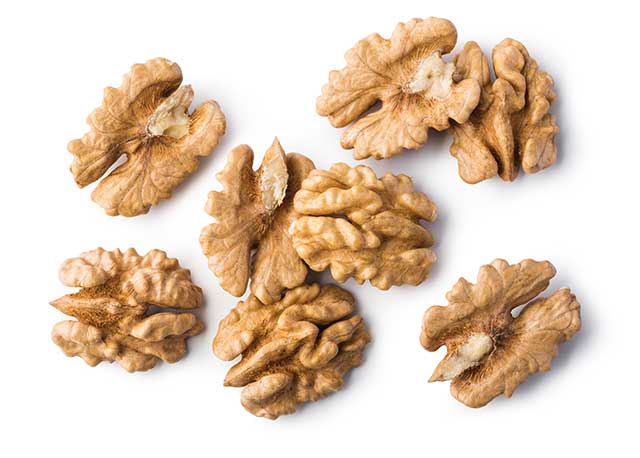
The following tables show the full nutritional values for walnuts, including their calorie, macronutrient, vitamin, and mineral profile (1).
Calories and Macronutrients
| Calories/Nutrient | Per 100 g | Per oz (28 g) |
|---|---|---|
| Calories | 654 kcal | 183 kcal |
| Carbohydrate | 13.7 g | 3.8 g |
| Fiber | 6.7 g | 1.9 g |
| Sugar | 2.6 g | 0.7 g |
| Fat | 65.2 g | 18.3 g |
| Saturated Fat | 6.1 g | 1.7 g |
| Monounsaturated Fat | 8.9 g | 2.5 g |
| Polyunsaturated Fat | 47.2 g | 13.2 g |
| Omega-3 | 9079 mg | 2542 mg |
| Omega-6 | 38092 mg | 10666 mg |
| Protein | 15.2 g | 4.3 g |
As shown, walnuts are extremely high in dietary fat, and they contain moderate amounts of carbohydrate and protein.
Vitamins
| Vitamin | Per 100 g (% RDI) | Per oz / 28 g (% RDI) |
|---|---|---|
| Vitamin B6 | 27 % | 8 % |
| Folate | 25 % | 7 % |
| Vitamin B1 | 23 % | 6 % |
| Vitamin B2 | 9 % | 2 % |
| Vitamin B3 | 6 % | 2 % |
| Vitamin B5 | 6 % | 2 % |
| Vitamin E | 4 % | 1 % |
| Vitamin K1 | 3 % | 1 % |
| Vitamin C | 2 % | 1% |
| Vitamin A | Trace | Trace |
Minerals
| Vitamin | Per 100 g (% RDI) | Per oz / 28 g (% RDI) |
|---|---|---|
| Manganese | 171 % | 48 % |
| Copper | 79 % | 22 % |
| Magnesium | 40% | 11 % |
| Phosphorus | 35 % | 10 % |
| Zinc | 21 % | 6 % |
| Iron | 16 % | 5 % |
| Potassium | 13 % | 4 % |
| Calcium | 10 % | 3 % |
| Selenium | 7 % | 2 % |
As shown in the tables, walnuts are an excellent source of vitamins and minerals, particularly copper, manganese, magnesium, and B vitamins.
Serving Size
A typical serving size is one ounce (28 grams) of walnuts per day.
Health Benefits of Walnuts
There are many benefits (and potential benefits) of walnuts.
In this section, we focus on the health benefits backed by scientific evidence.
1) A Rich Source of Omega-3
Walnuts contain the highest omega-3 content out of all nuts, and they are one of the most significant plant sources of these healthy fatty acids.
A one-ounce portion of walnuts provides more than 2.5 grams of omega-3 (1).
However, it is worth noting that the type of omega-3 is important. The type of omega-3 found in plant foods—and thus walnuts—is called alpha-linolenic acid (ALA).
On the negative side, ALA is a precursor to DHA and EPA (found in seafood), and it requires conversion inside the body to be usable.
Unfortunately, the successful conversion rate to EPA can range between 8% and 21%, depending on the individual.
For DHA, this figure drops to between 0% and 9%. In other words; ALA is not as bioavailable as seafood, and it shouldn’t be a direct replacement for it (2).
That said, ALA still contributes extra omega-3 to our diet, and it is an added benefit of walnut consumption.
2) Studies Show Walnuts May Have Anti-Inflammatory Properties
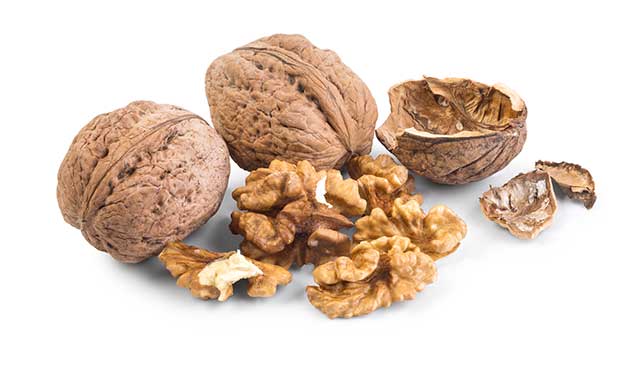
Several recent studies have looked into the effect of walnuts on inflammation.
Firstly, one trial suggests that the nuts may lower postprandial (after a meal) inflammation (3).
Additionally, studies demonstrate that ALA omega-3 consumption can inhibit vascular inflammation and decreases circulating markers of inflammation (4, 5, 6).
Also, a systematic review and meta-analysis of randomized controlled trials examined the effect of nut consumption, primarily almonds and walnuts, on markers of inflammation.
Although changes in inflammatory markers were non-significant and unclear, the study showed that nut consumption improved endothelial function (7).
3) High In Polyphenols
Walnuts are a rich source of polyphenols, and the compounds they contain include large amounts of ellagitannins (which convert to ellagic acids) and flavonols (8, 9).
Although the bioavailability of ellagitannins is quite poor, in-vivo animal studies show that these compounds may decrease inflammatory markers. These effects were especially visible in the colonic system, but they were also systemic (10, 11, 12).
Additionally, human gut microbiota metabolizes ellagic acid into compounds called urolithins.
Various studies demonstrate that urolithins may have a wide range of anti-inflammatory properties (13).
For other nuts high in polyphenols, see this review of pecan nuts.
4) Walnuts May Have Satiating Properties
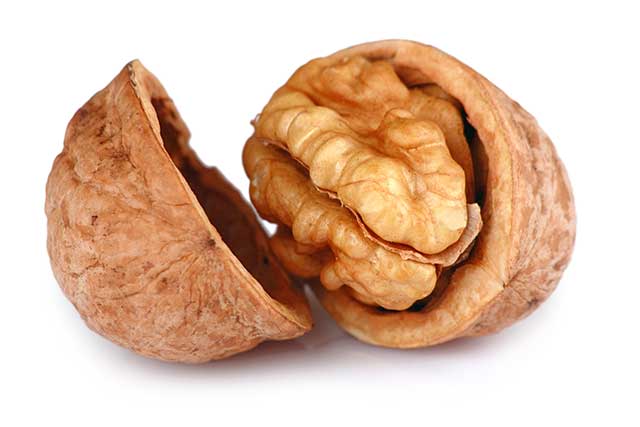
One of the most important considerations in maintaining a healthy weight and regulating food intake is satiety. If our diet is not satiating, then it makes it difficult to control our level of food consumption.
On this note, some studies suggest that walnuts have unique satiating properties. For example, in a randomized controlled trial, 20 participants with metabolic syndrome spend two 4-day periods in a clinical research center.
The diet of the participants was isocaloric and the same on both visits except for one thing; breakfast. The default breakfast was a shake including walnuts for one 4-day stay, and a placebo in the other.
Notably, the participants recorded decreased appetite and greater feelings of fullness on the walnut-containing diet (14).
But the Evidence Is Inconsistent
In a further randomized trial, one hundred non-diabetic but overweight participants were split into two groups. One group’s diet included between 28-42 grams of walnuts per day and the other contained no nuts.
However, there were no significant differences in self-reported satiety between the two groups (15).
Additionally, a further study also failed to confirm a link between walnut consumption and increased satiety (16).
5) Walnuts Supply a Decent Amount of Protein
Although a typical serving of walnuts won’t provide enough protein, walnuts still provide a good amount of protein per gram.
Walnuts have a protein density of around 15% by weight, which means they contain approximately 4 grams per serving (or 15 grams per 100 g) (17).
6) Walnuts May Have Beneficial Effects For Type 2 Diabetes Patients

Nuts have been the subject of several studies because of their potential benefits for individuals with (or at risk of) type 2 diabetes.
Furthermore, several studies have focused specifically on the effects of walnuts.
Here is an overview of the findings;
- A randomized controlled clinical trial, featuring twenty-four type 2 diabetes patients, looked at the effect of consuming 56 grams of walnuts per day for eight weeks. The results showed improvements in endothelial function, suggesting a reduction in cardiovascular risk (18).
- Another randomized controlled trial featured 112 participants at risk of diabetes. In this trial, daily walnut consumption for six months improved diet quality, endothelial function, and the cholesterol profile (19).
- In a randomized, controlled clinical trial, walnut oil consumption decreased total cholesterol, triglycerides, and LDL. At the same time, there “was a trend toward increasing HDL“. A better ratio of HDL to total cholesterol/triglycerides is strongly associated with improved cardiovascular outcomes (20).
7) Rich in Fiber
Walnuts contain 13.7 grams of carbohydrate per 100 grams, and around half of this carbohydrate content (6.7 grams) comes from fiber (21).
Large-scale studies suggest that people with a higher fiber intake enjoy better health.
For instance, a recent systematic review and meta-analysis analyzed a total of 243 studies—including 58 clinical trials—that featured 4635 participants.
This particular study showed that higher dietary fiber intake was protective against cardiovascular disease, type 2 diabetes, and some cancers (22).
However, an important part of the study to note is this: “Smaller or no risk reductions were found with the observational data when comparing the effects of diets characterized by low rather than higher glycaemic index or load.“
In other words, it is carbohydrate quality that counts, and eating higher amounts of fiber (rather than refined carbs) is likely to benefit health.
In the case of walnuts, these nuts contain high-quality fats AND high-quality carbs (as well as many beneficial nutrients).
8) Walnuts May Benefit Heart Health
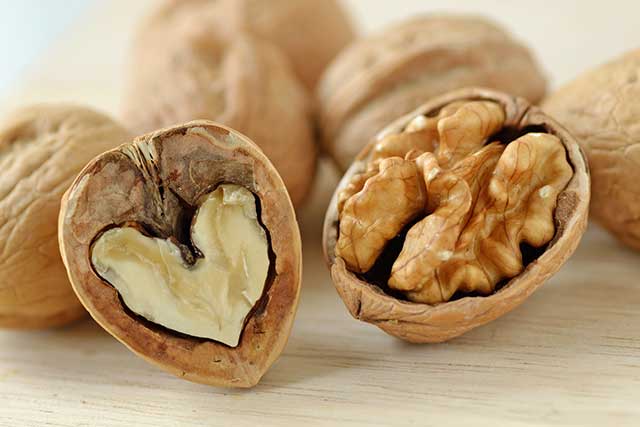
Walnut consumption appears to affect several important risk factors for cardiovascular disease positively.
For example, studies demonstrate that;
- Walnut consumption may lower blood pressure (23).
- Including walnuts in the diet can decrease oxidative stress (24).
- Endothelial function improves with greater walnut intake (25).
- Higher intake of walnuts increases cholesterol efflux (removing cholesterol from arterial walls) (26).
- Walnuts tend to lower levels of triglycerides (27, 28).
The above research shows that walnuts help to improve various markers of cardiovascular health.
As part of a healthy diet, walnuts may, therefore, help to lower cardiovascular risk.
9) May Improve Gut Health
A recent randomized controlled trial featuring 18 adults found that beneficially alters the gastrointestinal microbiota (29).
In this study, received calorie-matched diets featuring 0 or 42 grams of walnuts over two separate three week periods.
Pre and post-study tests showed that the walnut diet significantly increased the presence of beneficial gut bacteria compared to the no walnut diet.
The effects of the microbiome on human health is a very new field, and more research is necessary.
However, some researchers believe that healthy gut microbiota may help to strengthen immunity and protect against various illnesses (30, 31).
Potential Drawbacks
Walnuts are a healthy choice of food with numerous benefits.
However, all foods can affect different people in different ways, and there are two potential issues with walnuts.
1) Allergic Reactions
Tree nut allergies are responsible for a significant proportion of allergic reactions from food. In some cases, these reactions can be fatal (32).
As a type of tree nut, in rare cases, it is possible that walnuts could result in an allergic reaction.
Symptoms of an allergic reaction to walnuts could include nausea, breathlessness, itching, abdominal discomfort, and, in a worst-case scenario, anaphylaxis, which can be life-threatening (33).
2) May Cause Digestive Discomfort For IBS Patients
Irritable bowel syndrome (IBS) can lead to issues with the digestion of a wide range of foods.
However, some foods can create more problems than others.
On this note, unfortunately, walnuts are one of the most identified problematic foods by IBS patients (34, 35).
Final Thoughts
Overall, walnuts are a healthy and nutritious food choice.
These nuts are loaded with healthy fats, protein, fiber, and an assortment of essential nutrients.
As a bonus, they are a tasty way to potentially improve our health.
For more articles on nuts, see this guide to the nutrition benefits of hazelnuts.
Or see this in-depth look at pine nuts.

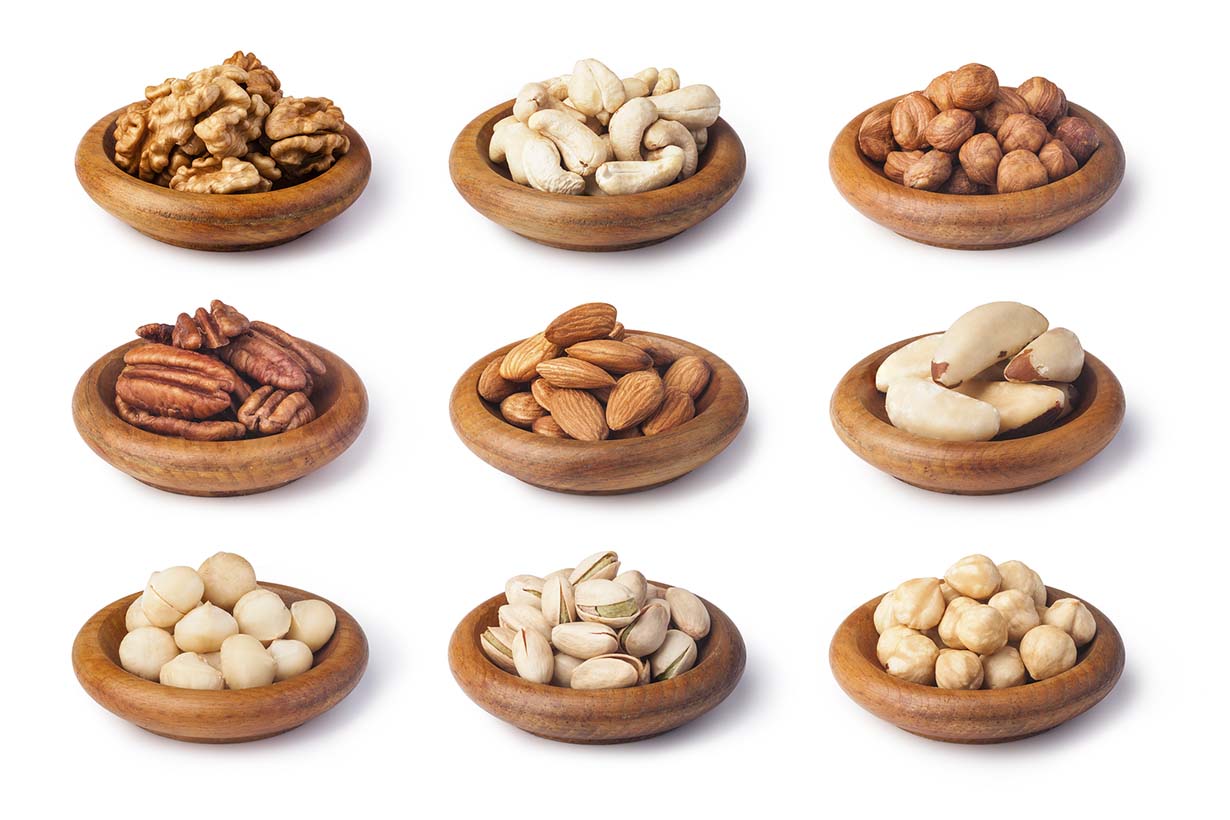

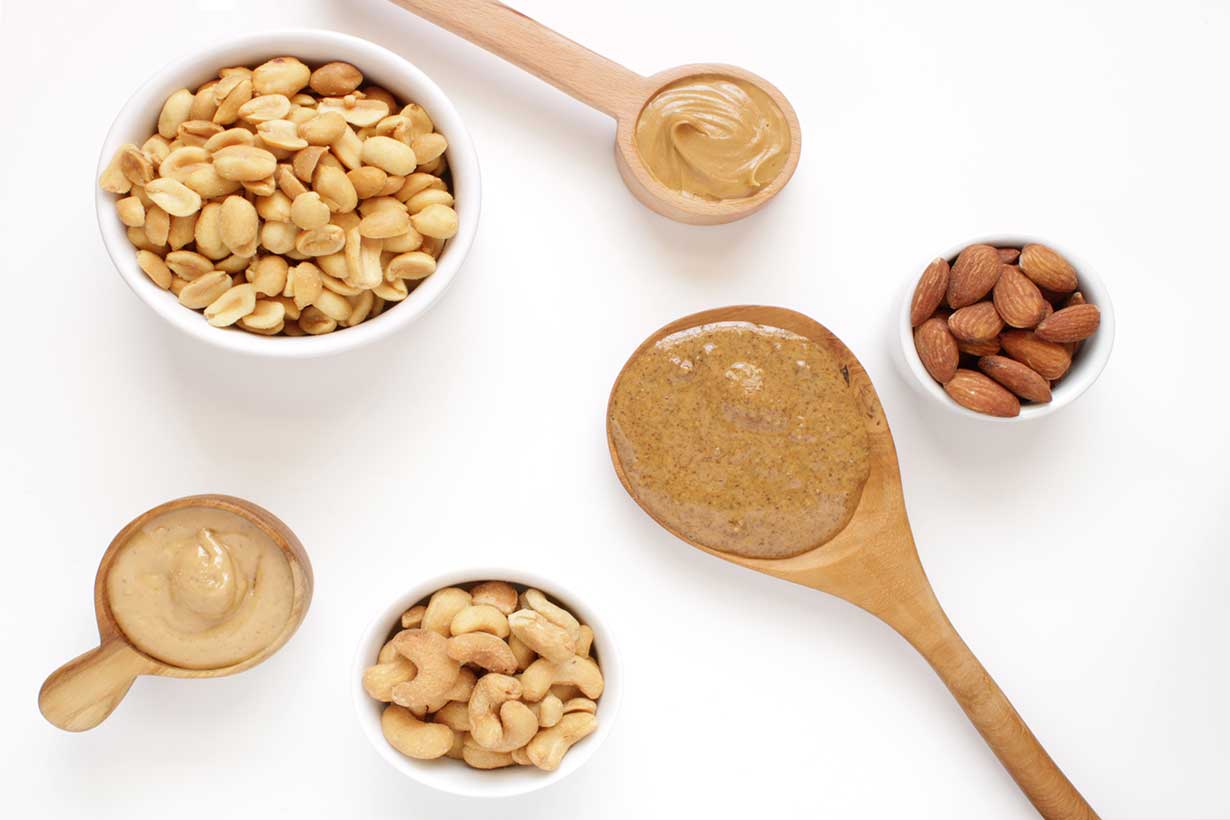



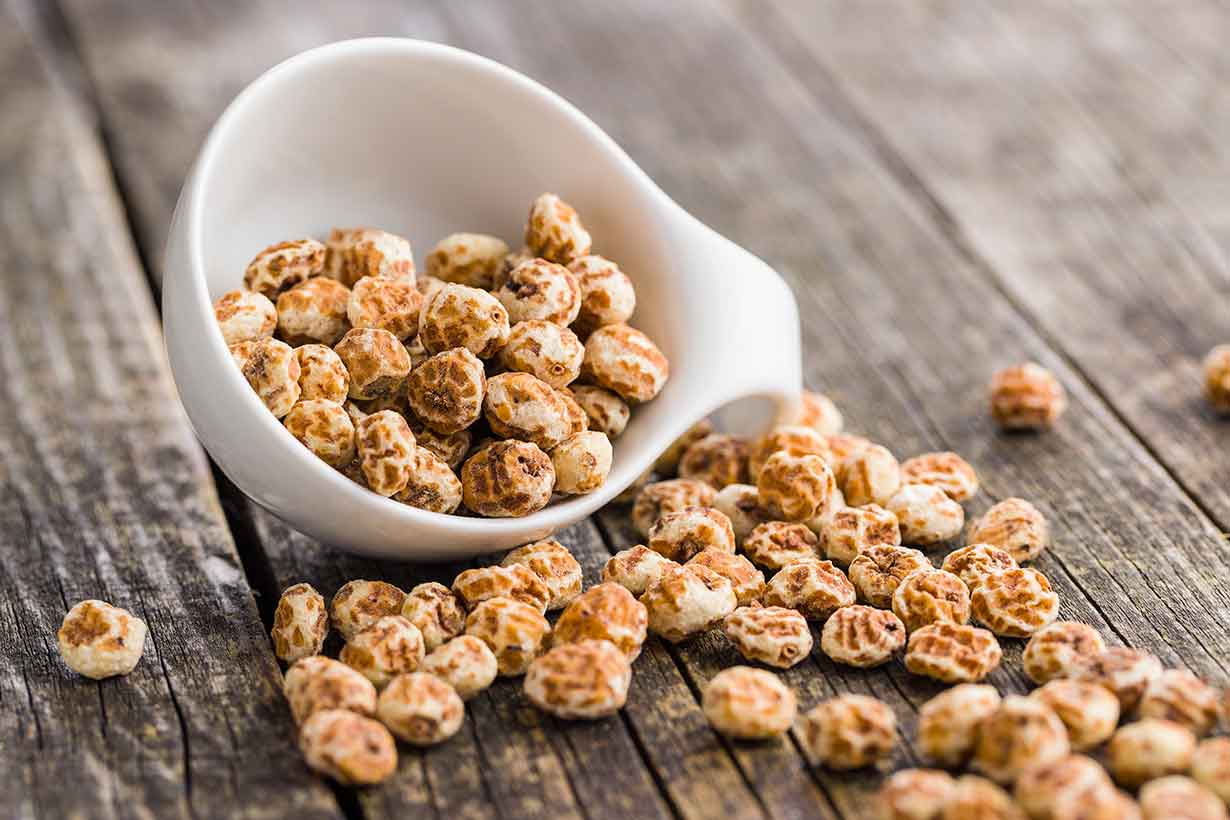

Now I know walnuts are good for health. I have references: in high-fat walnuts, is this fat good for the body?
Sure – there’s nothing wrong with the fat in walnuts.